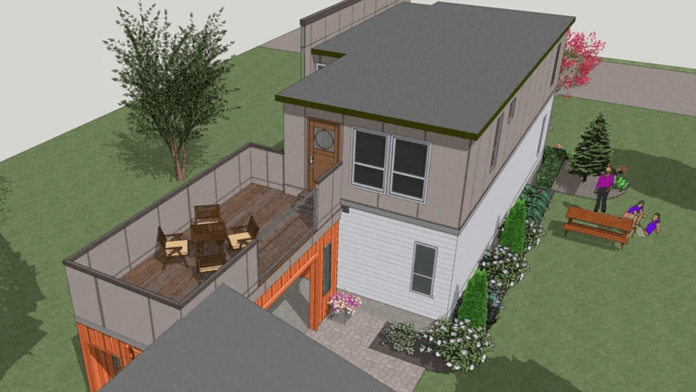In a groundbreaking initiative, a new development on Chicago’s South Side, known as Vincennes Village, is set to challenge the notion that eco-friendliness and luxury living cannot coexist. This ambitious project introduces 12 eco-friendly homes constructed from recycled shipping containers, embodying both modern living aesthetics and sustainability principles. Priced from $300,000, these homes aim to redefine urban living in an environmentally conscious way.
A Vision of Eco-Friendly Living
Vincennes Village represents an innovative approach to urban housing, where luxury is defined not just by aesthetics and comfort but also by environmental impact. Each home in the development will span between 1,200 to 1,800 square feet and incorporate energy-efficient features, including motion-activated lighting, which serves to lower energy consumption. Such features could attract homebuyers who place a premium on sustainability without sacrificing modern comforts.
Quick Construction, Less Labor
One of the standout features of the Vincennes Village project is the speed of construction. The developers claim that these homes can be built within three to four months—a timeframe that is almost half of what conventional homes typically take to complete. This efficiency results from utilizing shipping containers, which not only simplifies the process but also minimizes labor and building material requirements. Despite initial hopes to welcome families by the end of 2022, city delays have postponed the timeline to 2023.
Shipping Containers: A Growing Trend
Shipping container homes have been gaining attention for their versatility and modern appeal. However, they are often perceived as niche products, appealing mainly to those seeking unique or alternative living solutions. The Vincennes Village project could serve as a catalyst in changing public perceptions about container housing, highlighting that it can be both stylish and environmentally responsible.
According to a report by The Business Research Company, the global market for container housing is poised for substantial growth, with an expected compound annual growth rate of 7.3% until 2026, potentially reaching a $68 billion valuation. This trend suggests that more developments like Vincennes Village could soon emerge across urban America, bringing innovative living solutions to the forefront of the housing market.
The Challenges of Recycling
While using recycled shipping containers for housing presents a sustainable solution, it’s important to consider the potential drawbacks. Some containers may not be entirely eco-friendly—they might have previously held toxic substances or been treated with chemicals for corrosion protection, leaving residues that can pose health risks.
Experts like Gary London from the University of San Diego caution that while there’s interest in housing solutions using containers, for them to genuinely address housing shortages, they need to be more cost-effective than traditional housing options. Given the pricing of homes in Vincennes Village, it raises questions about whether container homes can truly be a financially accessible solution for everyone.
Diverse Applications for Container Homes
Despite the challenges, shipping containers have been effectively utilized in various contexts. Nonprofits like Habitat for Humanity have successfully constructed affordable housing utilizing this innovative approach in states like Ohio and Texas. Additionally, shipping containers serve as excellent foundations for tiny homes, a housing option that over 86% of Americans express interest in as a first home. This indicates a growing acceptance and interest in alternative forms of housing, particularly among younger demographics.
Conclusion: A New Chapter in Sustainable Living
As Vincennes Village prepares to welcome its first residents, it stands at the forefront of a potential transformation in how we view housing. By merging luxury and sustainability, this development not only meets the needs of modern homebuyers but also sets a precedent for future housing projects across the country. With a strong focus on efficient construction and eco-conscious living, it’s clear that the future of homes, including luxury ones, can indeed be green.
As the market for container housing expands, we may soon see a shift in urban landscapes, allowing sustainability to become a fundamental component of luxury living. For those interested in saving more, wasting less, and contributing positively to the planet, projects like Vincennes Village could represent a promising new path forward.














